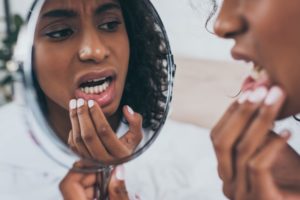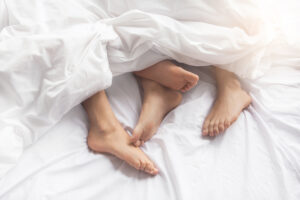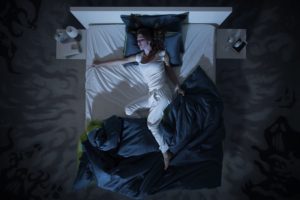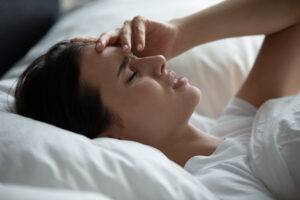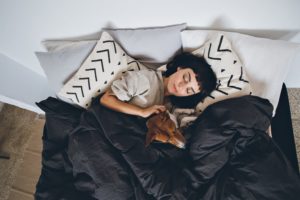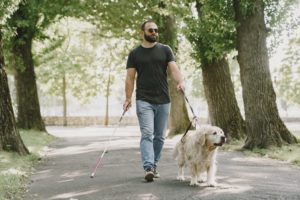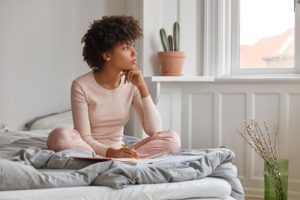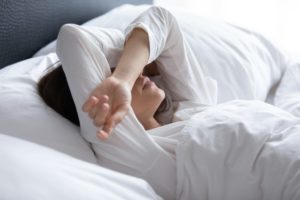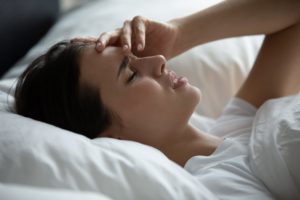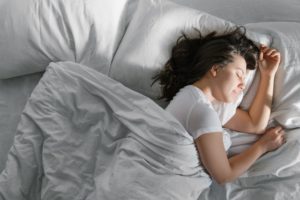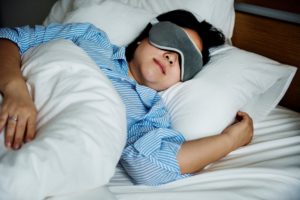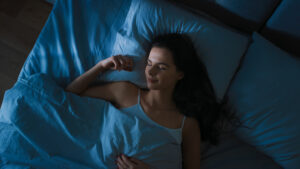When you buy through our links, we may earn a commission. Products or services may be offered by an affiliated entity. Learn more.
False Awakenings
Many of us have turned off the alarm clock, prepared a coffee, made the bed, and brushed our teeth — only to wake up and realize it was all a dream. These experiences are called false awakenings, and they are one of several strange phenomena that can happen during rapid eye movement (REM) sleep.
We discuss why false awakenings occur, how they relate to lucid dreaming and sleep paralysis, and when to see a doctor.
What Is a False Awakening?
During a false awakening, the sleeper believes they are awake when in reality they are still sleeping. False awakenings usually occur during rapid eye movement (REM) sleep, which is the sleep stage most closely tied to dreaming. There is relatively little research on false awakenings, although many people can relate to the experience.
Common dreamed activities during false awakenings include:
- Waking up and getting ready for the day
- Waking up in the middle of the night and going to the bathroom or kitchen, then returning to bed
- Exploring or wandering around the dream environment
- Thinking about a dream you just had before the false awakening, in the belief that you are now awake
Looking to improve your sleep? Try upgrading your mattress.
In contrast to normal dreams, which are often fantastical, false awakenings are typically realistic. You may believe you have woken up in your own bedroom, or that you are in another familiar place such as your school or workplace. The setting may be identical to real life or there may be small details that are different, such as odd shadows, lights that do not turn on, or doors that do not lead where they are supposed to lead. It is often not until later that you realize you were dreaming.
Most commonly, imagery in false awakenings feels similar to that of waking life, especially when false awakenings are experienced right before waking up in the morning. However, as with regular dreams, some false awakening dreams may be extraordinarily vivid. Others may be vague and dimly lit, especially those that occur in the middle of the night. Overall, people tend to remember dreams from false awakenings more easily than they remember regular dreams.
Researchers have pointed out that although the dreamer falsely believes they are awake after a false awakening, they retain a certain sense of consciousness. Unlike in a regular dream, the sleeper who dreams of a false awakening is aware that both dreams and reality exist. They may also have a nagging feeling that something is out of place, without being fully aware that they are dreaming.
Are False Awakenings Harmful?
Although false awakenings have been described as vivid and uncanny, experts do not believe they are harmful. But, like other events that happen on the threshold between wake and sleep, false awakenings may sometimes provoke fear, unease, or anxiety.
During a false awakening, you may have an out-of-body experience or sense a presence in the room, which may be accompanied by a feeling of dread. Earlier sleep researchers classified these ominous experiences as type 2 false awakenings, as opposed to the more neutral type 1 false awakenings.
False awakenings can also happen multiple times in a row, which may be distressing if the sleeper feels like they are unable to wake up. Similarly, false awakenings may lead to false memories, in which the person recalls having done something but then later finds evidence that it was all in a dream.
Is Your Troubled Sleep a Health Risk?
A variety of issues can cause problems sleeping. Answer three questions to understand if it’s a concern you should worry about.
Why Do I Have Dreams About Waking Up?
Researchers hypothesize that people experience false awakenings, or dream that they have woken up, as a result of hyperarousal or sleep disturbance during REM sleep. Hyperarousal is a concept often linked to insomnia. The term describes a state in which sleep, and REM sleep in particular, is more likely to be fragmented and of poor quality.
Although more research is needed, sleep scientists have proposed that REM sleep can be thought of as a practice stage for consciousness. Normally, what can occur in dreams during REM sleep is virtually limitless and the connections to reality are harder to make out. When REM sleep is disturbed, the sleeper’s waking memories come flooding in and bring dreams closer to reality.
In people with insomnia, hyperarousal dreams may center around real worries concerning sleep, reflecting alterations in the way the brain accesses memory storage during REM sleep. Similarly, experts have proposed that false awakenings represent a state in which the sleeper has more access than normal to waking memories.
Researchers have noticed that false awakenings often occur when the sleeper is anticipating something stressful, such as a sleep disruption. In this case, the sleeper may be more likely to experience a false awakening because they are unable to relax fully into sleep.
For example, one recent study found that people who attend a sleep lab often experience meta-dreams, such as false awakenings or lucid dreams, that incorporate elements of the sleep lab. The authors of the study pointed out that people typically experience fitful sleep on their first night in a sleep laboratory due to discomfort, anxiety, or a noisy environment, which may contribute to REM sleep hyperarousal.
False awakenings are often associated with the morning wake-up process. However, among lucid dreamers, who may be more likely to have fragmented sleep, a high proportion of false awakenings also occur in the middle of the night.
How Does False Awakening Relate to Other REM Sleep Phenomena?
A recent survey conducted in Russia found that people who experience false awakenings are more likely to experience other REM-related sleep phenomena as well. In addition to false awakening, REM phenomena include sleep paralysis, out-of-body experiences, and lucid dreaming. Experiencing REM phenomena may also be linked to the ability to recall dreams.
False awakenings, sleep paralysis, and lucid dreaming are all considered to arise from an intermediate state between REM sleep and wakefulness. It is difficult to purposely induce these states in order to study them in a sleep laboratory. However, emerging research suggests that false awakenings consist of a blend of the brain activity normally seen in sleep and wakefulness, with a greater proportion of brain waves that are characteristic of dreaming.
False Awakening and Sleep Paralysis
A person with sleep paralysis is mentally awake but unable to move most of their muscles, mirroring the muscle paralysis that occurs naturally during REM sleep. Sleep paralysis can happen as you are falling asleep or waking up. Researchers have found that about 75% of the time, hallucinations occur with sleep paralysis. For example, the sleeper may feel as if they sense an intruder entering the room. An out-of-body sensation may also accompany sleep paralysis.
Sleep paralysis and false awakenings are similar states that fall between sleep and wakefulness, in which a person looks asleep. A person experiencing sleep paralysis is mentally awake, however, while a person experiencing a false awakening wrongly believes they have just woken up, although they are still dreaming.
Sleep paralysis is more likely to occur in people with poor sleep quality, insomnia symptoms, or significant stress. Researchers have proposed that one way to reduce sleep paralysis may be to teach people how to gain control of their dreams, as sometimes occurs in lucid dreaming.
False Awakening and Lucid Dreaming
During a lucid dream, the sleeper remains asleep but gains awareness that they are in a dream. People with frequent lucid dreams also tend to experience higher-than-usual rates of false awakenings. Sometimes the two phenomena happen in conjunction. A lucid dream may be ended by a false awakening, and a false awakening can precede a lucid dream.
Examples of common false awakening scenarios reported by lucid dreamers include morning routines and exploring or wandering around the dream scenario. For example, you might believe you are getting out of bed and going about your normal morning routine, including eating breakfast and making the bed. Noticing odd details in your environment may cause you to realize that you are actually still dreaming. If you don’t wake up from this realization, then the false awakening becomes a lucid dream.
Some researchers believe that because lucid dreams and false awakenings often occur together, they must represent a similar mental state. People who use tactics to check if events are real or dreamed, such as trying to read a text or looking in the mirror, are more likely to enter a lucid dream after a false awakening. These tests, known as “reality checks,” have also been proposed as a method for managing sleep paralysis by exerting control over the dream scenario.
When to Talk to Your Doctor
False awakenings are not considered dangerous, but some people find them distressing. If false awakenings or other REM sleep phenomena are impacting the quality of your sleep or daily life, talk to your doctor for advice on how to sleep more soundly. They may be able to treat any underlying sleep disorders causing fragmented sleep, or teach you techniques to help you gain more control over your dreams.

Still have questions? Ask our community!
Join our Sleep Care Community — a trusted hub of product specialists, sleep health professionals, and people just like you. Whether you’re searching for the perfect mattress or need expert sleep advice, we’ve got you covered. Get personalized guidance from the experts who know sleep best.
References
9 Sources
-
Raduga, M., Kuyava, O., & Sevcenko, N. (2020). Is there a relation among REM sleep dissociated phenomena, like lucid dreaming, sleep paralysis, out-of-body experiences, and false awakening? Medical Hypotheses, 144, Article 110169.
https://pubmed.ncbi.nlm.nih.gov/32795836/ -
Buzzi, G. (2011). False awakenings in light of the dream protoconsciousness theory: A study in lucid dreamers. International Journal of Dream Research, 4(2), 110–116.
https://psycnet.apa.org/record/2011-26292-012 -
Denis, D. (2018). Relationships between sleep paralysis and sleep quality: Current insights. Nature and Science of Sleep, 10, 355–367.
https://pubmed.ncbi.nlm.nih.gov/30464663/ -
Nielsen, T., & Zadra, A. (2011). Idiopathic nightmares and dream disturbances associated with sleep-wake transitions. In Principles and Practice of Sleep Medicine (5th edition, pp. 1106–1115). Philadelphia: Saunders.
https://www.researchgate.net/publication/283415202_Idiopathic_Nightmares_and_Dream_Disturbances_Associated_with_Sleep-Wake_Transitions -
Riemann, D., Spiegelhalder, K., Nissen, C., Hirscher, V., Baglioni, C., & Feige, B. (2012). REM sleep instability–A new pathway for insomnia? Pharmacopsychiatry, 45(5), 167–176.
https://pubmed.ncbi.nlm.nih.gov/22290199/ -
Picard-Deland, C., Nielsen, T., & Carr, M. (2021). Dreaming of the sleep lab. PLoS One, 16(10), Article e0257738.
https://pubmed.ncbi.nlm.nih.gov/34614021/ -
Mainieri, G., Maranci, J. B., Champetier, P., Leu-Semenescu, S., Gales, A., Dodet, P., & Arnulf, I. (2021). Are sleep paralysis and false awakenings different from REM sleep and from lucid REM sleep? A spectral EEG analysis. Journal of Clinical Sleep Medicine: JCSM: Official Publication of the American Academy of Sleep Medicine, 17(4), 719–727.
https://pubmed.ncbi.nlm.nih.gov/33283752/ -
Mota-Rolim, S. A., & Araujo, J. F. (2013). Neurobiology and clinical implications of lucid dreaming. Medical Hypotheses, 81(5), 751–756.
https://pubmed.ncbi.nlm.nih.gov/23838126/ -
Buzzi, G. (2019). False awakenings in lucid dreamers: How they relate with lucid dreams, and how lucid dreamers relate with them. Dreaming, 29(4), 323–338.
https://psycnet.apa.org/record/2019-78466-004




